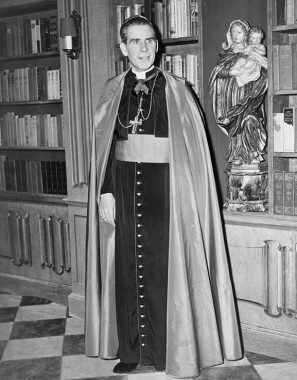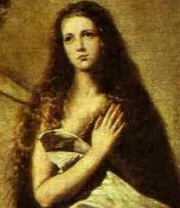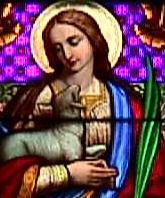Venerable Archbishop Fulton Sheen on Politics
January 21, 2015 by Patti Maguire Armstrong
Venerable Archbishop Fulton Sheen on Politics
Editor’s Note: Today, one day before the Day of Prayer for the Legal Protection of Unborn Children, Patti Maguire Armstrong reminds us of the words of wisdom Venerable Archbishop Fulton Sheen published in the 1940s and how they still ring true today.
… Sheen: A Lesson on Politics
Regarding religion and politics, I was…taken aback while reading a book written by Venerable Archbishop Fulton J. Sheen in 1947 titled: Characters of the Passion (Liguouri/Triumph). In it, he takes a look at the characters that played a role in the Passion of Jesus Christ and relates them to our modern world. No one would call 1947 modern, but the lessons of the passion held true in 1947 and still ring true today.
In chapter 3, “Pilate: A Lesson on Political Power,” Sheen dissecussed public opinion as it relates to politics. He stated:
“Those who have their finger on the pulse of contemporary civilization have probably noted that there are two contradictory charges against religions today. The first is that religion is not political enough; the other is that religion is too political. On the one hand, the Church is blamed for being too divine, and on the other, for not being divine enough. It is hated because it is too heavenly and hated because it is too earthly.”
Same old, same old.
Sheen portrayed the political/religious process as Jesus stood before the political Pilate and the religious Annas and Caiaphas. Christ was accused of being too religious before Annas and Caiaphas. Under the veil of mock indignation at the supposed insult to God’s majesty, Christ was declared too religious, too concerned with souls, too infallible and too Godly. After all, they cornered him into declaring Himself to be God. Sheen writes:
“Because He was too religious, He was not political enough. The religious judges said that He had no concern for the fact that the Romans were their masters, and that they might take away their country (John 11:47-48). By talking about a spiritual kingdom, a higher moral law, and His divinity, and by becoming the leader of a spiritual crusade, He was accused of being indifferent to the needs of the people and nation’s well being.”
Counter Church
Likewise, pro-lifers are accused of being too religious. Who are they to know the mind of God…to know when life really begins? We are accused of trying to force our religion on others, of being fanatics, of being downright dangerous to a free society.
Ultimately, Jesus was sent into the political arena, to Pilate. There, religious charges would not have prevailed. So instead, he was accused of being too political. Jesus is charged with meddling in national affairs; that He was not patriotic enough. “We have found this man perverting our nation, and forbidding to give tribute to Caesar, and saying that he is Christ the king” (Luke 23:2).
Sheen explained:
“And so throughout history, these two contradictory charges have been leveled against the Person of Christ in His Body the Church. His Church was accused of not being political enough when it condemned Nazism and Fascism; it is accused of being too political when it condemns Communism. It is the second charge that needs specific consideration, namely, that the Church is interfering in politics. Is this true? It all depends upon what you mean by politics. If by interference in politics is meant using influence to favor a particular regime, party, or system that respects the basic God-given rights and freedom of persons, the answer is emphatically No! The Church does not interfere in politics. If by interference in politics is meant judging or condemning a philosophy of life that makes the party or state, or the class, or the race, the source of all rights, and that usurps the soul and enthrones party over conscience and denies those basic rights for which the war was fought, the answer is emphatically Yes!
The Church does judge such a philosophy. But when it does this, it is not interfering with politics, for such politics is no longer politics but theology. When a state sets itself up as absolute as God, when it claims sovereignty over the soul, when it destroys freedom of conscience and freedom of religion, then the state has ceased to be political and has begun to be a counter-Church.”
It’s the Government that is Trespassing
In reality, the Church adapts itself to government, supporting authority. The Church teaches that the state is supreme in temporal matters. But when politics make religious proclamations–such as women have the right to end the life of their unborn babies–politics enters into the religious realm and claims supremacy over the human soul. Voting and campaigning against candidates and issues that compete with religion, is not against politics but against a counter religion.
For all the accusations that fundamentalist Christian and Catholic teaching is dangerous to our free society, the reality is quite the contrary. Preaching Christianity is sometimes labeled dangerous and incendiary. For instance, on the issue of homosexuality, the Christian churches are increasingly coming under fire for teaching against homosexual marriages. Never mind that the teaching advocates loving the sinner but hating the sin, politics claims that it’s not okay to hate the sin. Any teaching against this sin is more and more being labeled “hate” and said to encourage discrimination. Christians are not being allowed moral stances that could be viewed as discriminating against a lifestyle. Such a social straightjacket makes it impossible to teach right and wrong because it will offend the people engaging in the wrong.
As Sheen reminded his reader:
“It was Jesus Christ who suffered under Pontius Pilate; it was not Pontius Pilate who suffered under Jesus Christ. The grave danger today is not religion in politics but politics in religion.”
So when politicians preach a counter-religion message, such as the HHS [Health and Human Services] Mandate, which is the government forcing Catholic businesses to offer artificial birth control and abortifacients to their employees, our religious leaders have no choice but to protest. Although the politically correct clamor against invasion of the spiritual, if our eyes are open, we will see that the problem is just the opposite—the invasion of the spiritual by the political.
Christ was always and is forever our example. He did not deliver himself from the power of the state although he ultimately held all power: “You would have no power unless it were given to you from above” (John 19:11). But he never stopped preaching and living the truth. The state is often indifferent to God’s moral laws. Still, we must never give in or give up. We must be willing to bear the marks of Christ as we follow him.
Sheen equated God’s truths with true freedom:
“But whatever be the reason for these trying days, of this we may be certain: The Christ Who suffered under Pontius Pilate signed Pilate’s death warrant; it was not Pilate who signed Christ’s. Christ’s Church will be attacked, scorned, and ridiculed, but it will never be destroyed…. The bold fact the enemies of God must face is that modern civilization has conquered the world, but in doing so has lost its soul. And in losing its soul it will lose the very world it gained. Even our own so-called liberal culture in the United States, which has tried to avoid complete secularization by leaving little zones of individual freedom, is in danger of forgetting that these zones were preserved only because religion was in their soul. And as religion fades so will freedom, for only where the spirit of God is, is there liberty.”



 From such liturgical sources we may construct the following "life of St. Agnes". One day when Agnes, then thirteen years old, was returning home from school, she happened to meet Symphronius, a son of the city prefect. At once he became passionately attracted to her and tried to win her by precious gifts. Agnes repelled him, saying: "Away from me, food of death, for I have already found another lover" (r. Ant.). "With His ring my Lord Jesus Christ has betrothed me, and He has adorned me with the bridal crown" (3. Ant., Lauds). "My right hand and my neck He has encircled with precious stones, and has given me earrings with priceless pearls; He has decked me with lovely, glittering gems" (2. Ant.). "The Lord has clothed me with a robe of gold, He has adorned me with priceless jewels" (4. Ant.). "Honey and milk have I received from His mouth, and His blood has reddened my cheeks" (5. Ant.). "I love Christ, into whose chamber I shall enter, whose Mother is a virgin, whose Father knows not woman, whose music and melody are sweet to my ears. When I love Him, I remain chaste; when I touch Him, I remain pure; when I possess Him, I remain a virgin" (2. Resp.). "I am betrothed to Him whom the angels serve, whose beauty the sun and moon admire" (9. Ant.). "For Him alone I keep my troth, to Him I surrender with all my heart" (6. Ant.).
From such liturgical sources we may construct the following "life of St. Agnes". One day when Agnes, then thirteen years old, was returning home from school, she happened to meet Symphronius, a son of the city prefect. At once he became passionately attracted to her and tried to win her by precious gifts. Agnes repelled him, saying: "Away from me, food of death, for I have already found another lover" (r. Ant.). "With His ring my Lord Jesus Christ has betrothed me, and He has adorned me with the bridal crown" (3. Ant., Lauds). "My right hand and my neck He has encircled with precious stones, and has given me earrings with priceless pearls; He has decked me with lovely, glittering gems" (2. Ant.). "The Lord has clothed me with a robe of gold, He has adorned me with priceless jewels" (4. Ant.). "Honey and milk have I received from His mouth, and His blood has reddened my cheeks" (5. Ant.). "I love Christ, into whose chamber I shall enter, whose Mother is a virgin, whose Father knows not woman, whose music and melody are sweet to my ears. When I love Him, I remain chaste; when I touch Him, I remain pure; when I possess Him, I remain a virgin" (2. Resp.). "I am betrothed to Him whom the angels serve, whose beauty the sun and moon admire" (9. Ant.). "For Him alone I keep my troth, to Him I surrender with all my heart" (6. Ant.). Surrounded by flames she prayed with outstretched arms: "I beseech You, Father almighty, most worthy of awe and adoration. Through Your most holy Son I escaped the threats of the impious tyrant and passed through Satan's filth with feet unsullied. Behold, I now come to You, whom I have loved, whom I have sought, whom I have always desired." She gave thanks as follows: "O You, the almighty One, who must be adored, worshipped, feared - I praise You because through Your only begotten Son I have escaped the threats of wicked men and have walked through the filth of sin with feet unsullied. I extol You with my lips, and I desire You with all my heart and strength."
Surrounded by flames she prayed with outstretched arms: "I beseech You, Father almighty, most worthy of awe and adoration. Through Your most holy Son I escaped the threats of the impious tyrant and passed through Satan's filth with feet unsullied. Behold, I now come to You, whom I have loved, whom I have sought, whom I have always desired." She gave thanks as follows: "O You, the almighty One, who must be adored, worshipped, feared - I praise You because through Your only begotten Son I have escaped the threats of wicked men and have walked through the filth of sin with feet unsullied. I extol You with my lips, and I desire You with all my heart and strength."